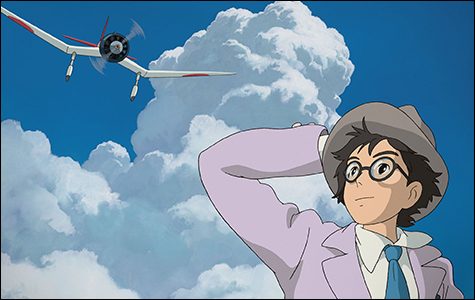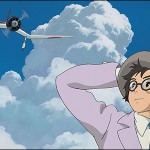For what is supposedly his final film, anime master Hayao Miyazaki ambitiously departs from his usual genre territory and yet still honors his innermost passions while once again expressing wonder through the imaginative eyes of its protagonist. The Wind Rises stands out in Miyazaki’s filmography because not only is it anchored in reality when nearly every other movie he’s directed is soaked in fantasy (“The Castle of Cagliostro,” his 1979 directorial debut, is his only other feature to not include considerable fantastical elements), but also because it’s actually a sort of biopic, a genre rarely attempted in animation. It’s exciting that such a successful and significant artist is still willing to shake things up so deep into his career and it’s also fitting that this journeying beyond subject matter borders still bears a visual and thematic stamp that immediately and intrinsically links The Wind Rises to the rest of Miyazaki’s titles in spite of their various differences.
Leaving behind giant fuzzy forest friends (“My Neighbor Totoro”), pig-faced pilots (“Porco Rosso”), broom-riding kid witches (“Kiki’s Delivery Service”), and magical underworlds (“Spirited Away”) hasn’t dulled Miyazaki’s sense of visual play in the slightest here. The Wind Rises may be a tribute to Japanese aeronautical engineer Jiro Horikoshi, whose plane designs helped make Japanese forces such a devastating aerial threat in World War II, but Miyazaki still brings sumptuous imagery and soaring imagination to luscious life in the midst of this grim, grounded reality.
Opening with a spectacular sequence that celebrates the beauty of flight with almost overwhelming grace, The Wind Rises presents its rich style, grand themes, and the psychological and emotional state of dreamer Jiro all before a single line of dialogue is uttered. Miyazaki compacts all of this information into a gorgeous cinematic poem that lasts a few minutes and is easily one of the most thrilling and delightful portions of the whole movie. Young Jiro imagines his bird-like, single-seat aircraft soaring over the land and water of his village before powering his plane to climb into the sky where he finds battle-ready enemies mobilized above the clouds. So much of what is to come is communicated here, from Jiro’s love of the rushing wind to the seemingly imminent intersection that puts his passion onto the path of war.
Following that lovely opening, Miyazaki settles into Jiro’s arc as we see him skip from plane-obsessed boy to plane-obsessed engineering student. Unable to spot a future as a pilot due to his poor eyesight, Jiro has turned his attention to the creation of planes. He takes inspiration from Italian designer Caproni, who Jiro meets in a shared dream space that allows the imaginations of both Jiro and Miyazaki to take flight in the most majestic of ways. These are among the movie’s strongest, loveliest moments because Miyazaki reveals a funny, vibrant land of adventure where hand-drawn characters and foregrounds meet painted backgrounds, all backed by marvelously organic sound design, creating a terrifically textured experience that is so rarely viewed or heard on the big screen anymore.
The deeper we get into the movie, the rarer the dream sequences become. Or at least, that’s the impression the picture leaves as it turns its focus to Jiro’s career and the dark reality that Japan’s need for fresh plane designs is fed by the prospect of war. Scenes concerned with the details of the designs, such as first abandoning their wood and canvas models for metal designs pioneered by the Germans and then later opting for flush rivets to reduce drag, are also exciting in how they drill down to the core of Jiro’s passion and talent. But with this portion of the picture comes a love story that is mechanically convenient and sadly conventional. It’s also conventionally sad, though thematically it matches Jiro’s journey in the world of aviation, so the reasons Miyazaki makes for its inclusion are at least carefully considered.
The problem is that it grinds The Wind Rises to a halt for a significant amount of time, providing some sweetness, but mainly at the expense of the wondrous energy that previously powered the picture to such delightful heights. The otherwise sharp pacing hits a rough patch during this clunky chunk of the narrative, although Miyazaki still ties the pieces together in the end to create a movingly sombre conclusion that touches on the horrors of loss and destruction and the importance of fulfilling your dreams regardless of the outcome.
Jiro’s clichéd love story is the single misstep Miyazaki takes in The Wind Rises and it’s a considerable one because the movie feels utterly unique up to the point that the romance is suddenly shoehorned into the plot. Treating it as a stiffly standard bid for sentimentality then stands out rather glaringly in the midst of such memorable originality. Still, it’s one mistake in a vast picture that often offers a new way to look at Miyazaki’s genius.
If this really is Miyazaki’s final directorial effort, then it’s curiously intriguing that he would bookend his filmography with his only two features that tone down the fantastical elements. It speaks to his well-rounded career as an artist and suggests a special symmetry, but The Wind Rises also feels like a gently comforting end. Perhaps that’s ironic given the subject matter and the damage Jiro’s planes caused, but it is in the final moments of what may be his final movie that Miyazaki takes the time to reflect, to look back on his passions, themes, and dreams through a decidedly adult eye and conclude that it’s been a worthy past. His future is still ahead, waiting wherever the wind will take him.






'Movie Review: The Wind Rises (2013)' has no comments